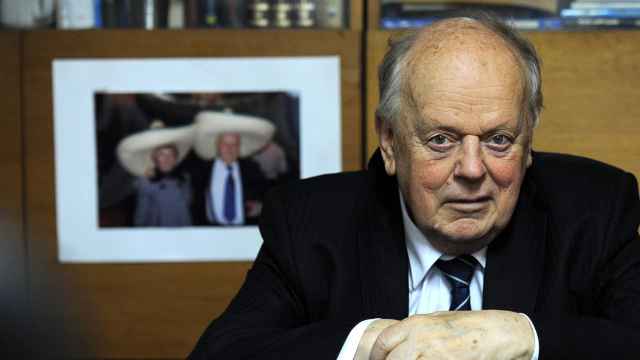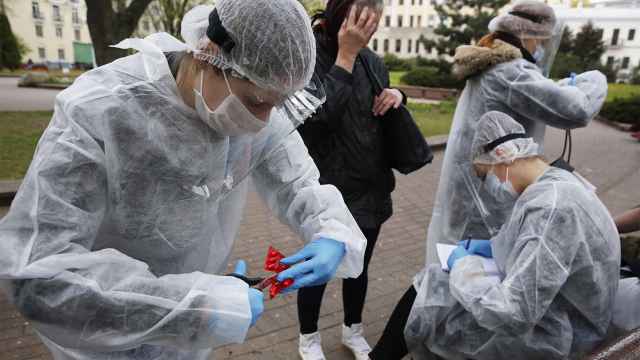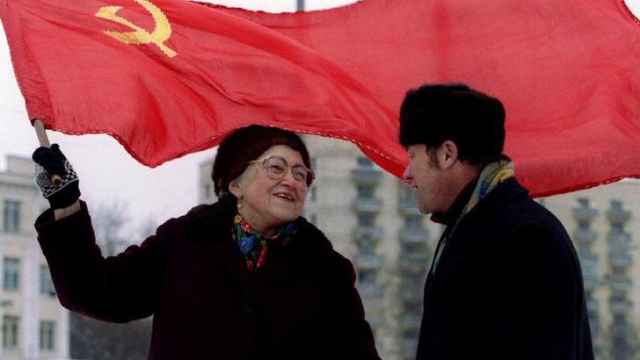As Russia closed its borders and moved toward increasingly strict self-isolation measures, its post-Soviet neighbors have taken a wide range of approaches to the rapidly spreading coronavirus pandemic, from relaxed to high-alert.
Here’s a look at how some of the post-Soviet republics, where 4,375 people have been infected across 12 countries as of Wednesday, are faring:
Belarus (152), Ukraine (645), Moldova (353)
— Belarussian President Alexander Lukashenko continued to dismiss what he called the “psychosis” surrounding coronavirus, saying the infection could be fended off with vodka, sauna and driving tractors.
The Belarus Premier League is among the only remaining professional football leagues still playing amid a string of cancellations across the world, drawing attention from action-starved fans and criticism from the sport’s authorities.
Despite their president’s relaxed attitude toward the pandemic, the country’s schools and businesses have started to voluntarily close without waiting for Lukashenko’s orders.
Belarus officially reported two deaths from coronavirus, one of which has apparently been reclassified a day later as “undetermined pneumonia.”
— Ukraine suspended all commercial passenger travel and barred foreign nationals from entering the country. It also closed all establishments except pharmacies, supermarkets and banks.
Thousands of Ukrainian migrants, many wearing face masks, flocked to the Polish border in cramped conditions after Kiev announced border closures last Friday.
The self-proclaimed Donetsk republic in pro-Russian rebel-held eastern Ukraine announced its first coronavirus case Tuesday.
— Moldova, with one confirmed death, has suspended international flights and shut its borders.
Turkmenistan (0), Tajikistan (0)
— Like Belarus’ Lukashenko, the president of gas-rich Turkmenistan urged Turkmens to burn a traditional herb to fight respiratory infections.
Turkmenistan, which shut its borders, suspended international travel, sealed off entry to its capital and restricted movement between regions, has reported no official coronavirus cases.
— Tajikistan, which also reported no coronavirus cases, stopped incoming flights starting March 20.
Georgia (110), Armenia (532), Azerbaijan (298)
— The South Caucasus republic of Georgia imposed a curfew Tuesday, shutting public transportation, banning gatherings of more than three people and prohibiting travel between towns and cities. The country previously shut its border to foreigners.
Georgia also banned alcohol sales for the duration of its state of emergency until April 21.
— Armenia declared a month-long state of emergency on March 16 and extended restrictions on free movement and businesses until April 10.
Lawmakers in Armenia also passed emergency legislation that will allow its government to track people’s movements through their phones’ geolocation data.
— Azerbaijan tightened quarantine rules last weekend, banning non-essential vehicles from moving between cities and regions.
The country ordered nonessential shops to close, restricted access to parks and recreation areas, shut its public transportation system and halted passenger flights.
Kazakhstan (343), Uzbekistan (154), Kyrgyzstan (107)
— Oil-rich Kazakhstan closed its borders after confirming its first coronavirus case on March 16 and has locked down two of its main cities.
As of last weekend, residents of the Kazakh capital of Nur-Sultan and the country’s largest city Almaty were barred from leaving their homes except to buy food and medicine or to go to work.
Kazakhstan has since widened its coronavirus lockdown to at least six major cities.
— Fellow Central Asian country Uzbekistan also sealed its borders March 16 and locked down some of its biggest cities.
Uzbekistan has since suspended inter-regional passenger travel and barred citizens from leaving homes except for work or food-and-medicine shopping. The government also banned gatherings of more than three people.
— Kyrgyzstan declared a national emergency, enacting a curfew, travel restrictions and non-essential store closures. The first infections in the Muslim-majority country were uncovered among those who had returned from an Islamic pilgrimage to Saudi Arabia.
On Wednesday, Kyrgyzstan’s president fired the health minister and his deputy after criticizing their efforts to fight the outbreak.
The impoverished country was the first to receive $121 million in emergency funding from the International Monetary Fund in the wake of the global pandemic.
Latvia (398), Lithuania (537), Estonia (745)
— As members of the European Union’s 22-country Schengen open border zone, the three former Soviet republics banned entry to foreign nationals for 30 days.
— The eastern European nations have also stepped up national restrictions, including border checks and closed air routes.
A Message from The Moscow Times:
Dear readers,
We are facing unprecedented challenges. Russia's Prosecutor General's Office has designated The Moscow Times as an "undesirable" organization, criminalizing our work and putting our staff at risk of prosecution. This follows our earlier unjust labeling as a "foreign agent."
These actions are direct attempts to silence independent journalism in Russia. The authorities claim our work "discredits the decisions of the Russian leadership." We see things differently: we strive to provide accurate, unbiased reporting on Russia.
We, the journalists of The Moscow Times, refuse to be silenced. But to continue our work, we need your help.
Your support, no matter how small, makes a world of difference. If you can, please support us monthly starting from just $2. It's quick to set up, and every contribution makes a significant impact.
By supporting The Moscow Times, you're defending open, independent journalism in the face of repression. Thank you for standing with us.
Remind me later.






